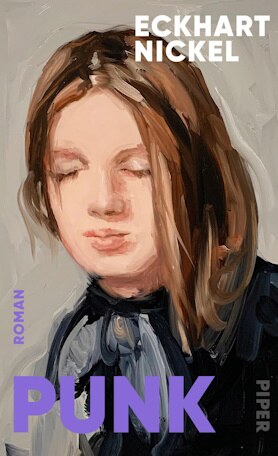Fiction
Empowerment for Art
For decades now, Frankfurt author Eckhart Nickel has been creating literary havens for beauty. In challenging times for our liberal democracy, his outstanding trilogy – “Hysteria,” “Spitzweg,” and “Punk” – shows that beauty can also be a resource worth fighting for, if not living for.
“Crazy!” This word appears with particular frequency in Eckhart Nickel’s novel Punk. “Crazy!” is not just a reference to the debut novel by Büchner Prize winner Rainald Goetz from 1983; every page of this euphoric eye-opening pop narrative is “crazy!” In the near future, a peculiar acoustic phenomenon appears seemingly out of nowhere. It is not a new musical genre, but a kind of omnipresent static hiss, euphemistically termed “white noise”. This white noise becomes ambient noise. Physics knows “white noise” as random sounds that mask disturbing acoustic frequencies, gradually dimming them, making them more pleasant. Here, the homonymous “white noise” prevents any and all perception of music. It suppresses negative speech, injurious statements, any sort of interference. What emerges is a woke fantasy theme park.
“Because of the drowned-out negative emotions, perhaps the most surprising side effect of this White Noise consisted in the fact that all feelings of happiness like excitement or euphoria soon vanished as well, albeit not through interference, but fairly casually and in passing, as if someone had dialed down a knob, thereby depriving the general human emotional range of its extremes and clipping its ends, such that, to put it in acoustic jargon, only mid-range tones within a limited spectrum were left at all.”
The novel’s narrator is the young twentysomething, Karen. After graduating from high school, she is accepted into the shared apartment of art-minded brothers Ezra and Lambert, who have found their own very distinctive approach to the peculiar acoustic phenomenon. This odd couple lives in a canned version of that space of pop culture references which was shuttered by the time the print edition of Spex was suspended and which has not been reopened since, in a moody amalgam of film quotations, philosophical distortions, insider knowledge about obscure indie bands, and an academic view of the entertainment industry. Ezra and Lambert are first-class nerds, standard bearers of this defunct culture.
The duo has designed a soundproof stereo lab in which – contrary to all prohibitions – they produce music: Punk! And Karen is to be their singer. The sort of regulatory challenges facing this protest band shall not be revealed, but let this much be said: the stereo lab is a typical site for Eckhart Nickel’s literature. For there was already a fortress against insensitivity to emotion in the preceding novel Spitzweg from 2022, dubbed at the time not a “stereo lab,” but somewhat more mundanely the “art lair.” Nickel’s multiply award-winning debut Hysteria (published 2018) also told of a shelter against an estranged virtual world contaminated by non-sensual fakes.
In Hysteria, the mistrust began with a bite into a curiously bland raspberry. In the subsequent novel Spitzweg, a shaming by an art teacher leads to the establishment of the aforementioned “lair,” the refuge of the young people introduced in the text. Punk, too, opens with a humiliation, with an embarrassing piano recital. It is not an art teacher, but the piano instructor Madame Framboise who appears here as devil’s advocate. With this French allusion to the raspberry, it immediately becomes clear that Punk can also be read as an intra- and extratextual literary game. It is pleasurable to trace all these references to pop culture and earlier books and the profusion of multiple meanings arising from them.
This abundance serves a complexity-producing poetology behind it all that positions itself against simplifications, overcautious rules of speech and “ways of being,” against algorithmized songs optimized for playing on social media, to wit: against the bloodletting of our history of humanistic successes. It is by all means cultural criticism, but no grandfatherly attitude of everything-was-Spexier-in-the-old-days. Nickel’s language is exuberantly expressive, his allusions subtly curated, allowing for emphasis and all sorts of serious and unserious jokes. This literature of richness balks at politically opportune statements, fits of indignation that crave likes, harmless anger. This literature is empowerment for art – and it shows that the manifestation of the beautiful can be a refuge, a safe space, a lair.
Especially in times like these, we need beauty; we encounter it ever more infrequently – we hardly ever glimpse unbroken beauty anymore, only seldom do we find solace. But it is solace we find here – in the literature of Eckhart Nickel, which feels indebted to the beautiful and which looks out into the world, shouting in wonder with a euphoric voice: “Crazy!”
Translated by Daniel Bowls
By Jan Drees
Jan Drees is the literature editor for Deutschlandfunk and host of the radio show “Büchermarkt.” He is on the team of critics for the 3sat broadcast “Kulturzeit,” a member of various juries, and the author of novels and works of nonfiction like “Staring at the Sun” (2000), “Letzte Tage, jetzt” (2011), “Sandbergs Liebe” (2019), and “Literatur der Krise: Das Novellen-Werk von Hartmut Lange” (2022). Jan Drees runs the blog lesenmitlinks.de.


